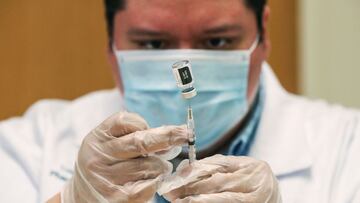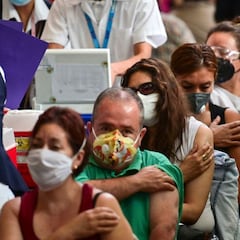Can a vaccinated person spread covid-19?
Despite nearly half of the American population having now received at least one dose, the CDC is still unsure how effectively it prevents the spread of covid-19 amongst vaccinated people.


The latest figures show that nearly half of the US population have now received at least one dose of a covid-19 vaccine as both infection and death rates continue to fall.
The Centers for Disease Control and Prevention (CDC) say that as of 25 May 2021, 164.4 million people (49.5% of the population) have received a dose while 131.1 million people (39.5% of the population) are fully vaccinated.
Read more:
- Covid vaccine in the US: live updates
- CDC issues new holiday advice for US travellers
- What are the most common covid-19 strains in the US?
- Possible connection between heart issues and covid vaccines are not new
- Covid-19 vaccine booster shots may be necessary
The continued vaccine rollout will be central to beating the coronavirus, but experts are still unsure if vaccinated people are less likely to pass on covid-19. The latest information from the CDC reads:
“We are still learning how well vaccines prevent you from spreading the virus that causes covid-19 to others, even if you do not have symptoms. Early data show that vaccines help keep people with no symptoms from spreading covid-19.”
Do vaccines prevent the spread of covid-19?
To fully understand how the virus reacts to fully vaccinated individuals the CDC require as much data as possible on instances of infection. As of 14 April 2021, they were aware of 5,814 fully vaccinated individuals who went on to become infected with covid-19. A report in National Geographic states that, of that number, 7% were hospitalised and 1% died.
A breakthrough infection is when a fully vaccinated person becomes infected with COVID-19.
— Yahoo News (@YahooNews) May 26, 2021
The new CDC report shows that such breakthrough infections may occur in just 0.01% of all fully vaccinated people https://t.co/EY8RxAPGvV
While vaccines are primarily developed to prevent the disease they are not typically designed to prevent infection entirely, meaning that vaccinated individuals can still act of vectors for the virus. Jason Kindrachuk, assistant professor of virology at the University of Manitoba, makes clear that achieving immunity from infection is incredibly tricky:
“The holy grail of vaccine development always is to stop people from ever getting infected, but it is monumentally difficult to get that.”
However, four months after the first coronavirus vaccines were approved for emergency use in the US the CDC was able to deduce that vaccines can substantially reduce instances of infection and therefore reduce the likelihood of a vaccinated person passing the virus on.
How do vaccine work against covid-19?
On a basic level the various covid-19 vaccines all work in a similar way, by mimicking the conditions of an infection to trick your immune system into fighting it off. If you are then infected with the real virus your body will be better prepared to tackle the infection.
Juliet Morrison, assistant professor of microbiology at the University of California, points out that this can be so effective that your body is sometimes able to “clear the infection without you even recognizing that you’ve gotten sick.”
The following is a roundup of some of the latest scientific studies on the novel coronavirus and efforts to find treatments and vaccines for COVID-19, the illness caused by the virus. https://t.co/YqoTVu1SWV
— Reuters Science News (@ReutersScience) May 26, 2021
Related stories
She adds: “You have white blood cells, specifically T and B cells, that hang around and remember that initial infection so that if you do become infected again, these memory cells respond by immediately multiplying their numbers.”
If the existing covid-19 vaccines are effective enough, there is hope that they could prevent the infection from even entering your system and therefore avoid the risk of passing it on to a non-vaccinated individual.

